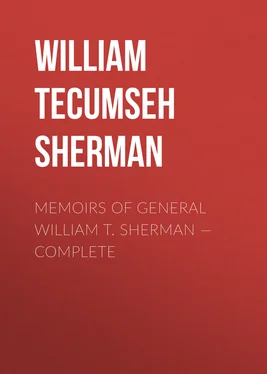William Tecumseh Sherman - Memoirs of General William T. Sherman — Complete
Здесь есть возможность читать онлайн «William Tecumseh Sherman - Memoirs of General William T. Sherman — Complete» — ознакомительный отрывок электронной книги совершенно бесплатно, а после прочтения отрывка купить полную версию. В некоторых случаях можно слушать аудио, скачать через торрент в формате fb2 и присутствует краткое содержание. Жанр: Биографии и Мемуары, История, foreign_edu, foreign_antique, foreign_prose, на английском языке. Описание произведения, (предисловие) а так же отзывы посетителей доступны на портале библиотеки ЛибКат.
- Название:Memoirs of General William T. Sherman — Complete
- Автор:
- Жанр:
- Год:неизвестен
- ISBN:нет данных
- Рейтинг книги:4 / 5. Голосов: 1
-
Избранное:Добавить в избранное
- Отзывы:
-
Ваша оценка:
- 80
- 1
- 2
- 3
- 4
- 5
Memoirs of General William T. Sherman — Complete: краткое содержание, описание и аннотация
Предлагаем к чтению аннотацию, описание, краткое содержание или предисловие (зависит от того, что написал сам автор книги «Memoirs of General William T. Sherman — Complete»). Если вы не нашли необходимую информацию о книге — напишите в комментариях, мы постараемся отыскать её.
Memoirs of General William T. Sherman — Complete — читать онлайн ознакомительный отрывок
Ниже представлен текст книги, разбитый по страницам. Система сохранения места последней прочитанной страницы, позволяет с удобством читать онлайн бесплатно книгу «Memoirs of General William T. Sherman — Complete», без необходимости каждый раз заново искать на чём Вы остановились. Поставьте закладку, и сможете в любой момент перейти на страницу, на которой закончили чтение.
Интервал:
Закладка:
On the 17th of November, 1859, the Governor of the State, Wickliffe, issued officially a general circular, prepared by us, giving public notice that the "Seminary of Learning" would open on the 1st day of January, 1860; containing a description of the locality, and the general regulations for the proposed institution; and authorizing parties to apply for further information to the "Superintendent," at Alexandria, Louisiana.
The Legislature had appropriated for the sixteen beneficiaries at the rate of two hundred and eighty-three dollars per annum, to which we added sixty dollars as tuition for pay cadets; and, though the price was low, we undertook to manage for the first year on that basis.
Promptly to the day, we opened, with about sixty cadets present. Major Smith was the commandant of cadets, and I the superintendent. I had been to New Orleans, where I had bought a supply of mattresses, books, and every thing requisite, and we started very much on the basis of West Point and of the Virginia Military Institute, but without uniforms or muskets; yet with roll-calls, sections, and recitations, we kept as near the standard of West Point as possible. I kept all the money accounts, and gave general directions to the steward, professors, and cadets. The other professors had their regular classes and recitations. We all lived in rooms in the college building, except Vallas, who had a family, and rented a house near by. A Creole gentleman, B. Jarrean, Esq., had been elected steward, and he also had his family in a house not far off. The other professors had a mess in a room adjoining the mess-hall. A few more cadets joined in the course of the winter, so that we had in all, during the first term, seventy-three cadets, of whom fifty-nine passed the examination on the 30th of July, 1860. During our first term many defects in the original act of the Legislature were demonstrated, and, by the advice of the Board of Supervisors, I went down to Baton Rouge during the session of the Legislature, to advocate and urge the passage of a new bill, putting the institution on a better footing. Thomas O. Moors was then Governor, Bragg was a member of the Board of Public Works, and Richard Taylor was a Senator. I got well acquainted with all of these, and with some of the leading men of the State, and was always treated with the greatest courtesy and kindness. In conjunction with the proper committee of the Legislature, we prepared a new bill, which was passed and approved on the 7th of March, 1860, by which we were to have a beneficiary cadet for each parish, in all fifty-six, and fifteen thousand dollars annually for their maintenance; also twenty thousand dollars for the general use of the college. During that session we got an appropriation of fifteen thousand dollars for building two professors' houses, for the purchase of philosophical and chemical apparatus, and for the beginning of a college library. The seminary was made a State Arsenal, under the title of State Central Arsenal, and I was allowed five hundred dollars a year as its superintendent. These matters took me several times to Baton Rouge that winter, and I recall an event of some interest, which most have happened in February. At that time my brother, John Sherman, was a candidate, in the national House of Representatives, for Speaker, against Bocock, of Virginia. In the South he was regarded as an "abolitionist," the most horrible of all monsters; and many people of Louisiana looked at me with suspicion, as the brother of the abolitionist, John Sherman, and doubted the propriety of having me at the head of an important State institution. By this time I was pretty well acquainted with many of their prominent men, was generally esteemed by all in authority, and by the people of Rapides Parish especially, who saw that I was devoted to my particular business, and that I gave no heed to the political excitement of the day. But the members of the State Senate and House did not know me so well, and it was natural that they should be suspicions of a Northern man, and the brother of him who was the "abolition" candidate for Speaker of the House.
One evening, at a large dinner-party at Governor Moore's, at which were present several members of the Louisiana Legislature, Taylor, Bragg, and the Attorney-General Hyams, after the ladies had left the table, I noticed at Governor Moore's end quite a lively discussion going on, in which my name was frequently used; at length the Governor called to me, saying: "Colonel Sherman, you can readily understand that, with your brother the abolitionist candidate for Speaker, some of our people wonder that you should be here at the head of an important State institution. Now, you are at my table, and I assure you of my confidence. Won't you speak your mind freely on this question of slavery, that so agitates the land? You are under my roof, and, whatever you say, you have my protection."
I answered: "Governor Moors, you mistake in calling my brother, John Sherman, an abolitionist. We have been separated since childhood—I in the army, and he pursuing his profession of law in Northern Ohio; and it is possible we may differ in general sentiment, but I deny that he is considered at home an abolitionist; and, although he prefers the free institutions under which he lives to those of slavery which prevail here, he would not of himself take from you by law or force any property whatever, even slaves."
Then said Moore: "Give us your own views of slavery as you see it here and throughout the South."
I answered in effect that "the people of Louisiana were hardly responsible for slavery, as they had inherited it; that I found two distinct conditions of slavery, domestic and field hands. The domestic slaves, employed by the families, were probably better treated than any slaves on earth; but the condition of the field-hands was different, depending more on the temper and disposition of their masters and overseers than were those employed about the house;" and I went on to say that, "were I a citizen of Louisiana, and a member of the Legislature, I would deem it wise to bring the legal condition of the slaves more near the status of human beings under all Christian and civilized governments. In the first place, I argued that, in sales of slaves made by the State, I would forbid the separation of families, letting the father, mother, and children, be sold together to one person, instead of each to the highest bidder. And, again, I would advise the repeal of the statute which enacted a severe penalty for even the owner to teach his slave to read and write, because that actually qualified property and took away a part of its value; illustrating the assertion by the case of Henry Sampson, who had been the slave of Colonel Chambers, of Rapides Parish, who had gone to California as the servant of an officer of the army, and who was afterward employed by me in the bank at San Francisco. At first he could not write or read, and I could only afford to pay him one hundred dollars a month; but he was taught to read and write by Reilley, our bank-teller, when his services became worth two hundred and fifty dollars a month, which enabled him to buy his own freedom and that of his brother and his family."
What I said was listened to by all with the most profound attention; and, when I was through, some one (I think it was Mr. Hyams) struck the table with his fist, making the glasses jingle, and said, "By God, he is right!" and at once he took up the debate, which went on, for an hour or more, on both sides with ability and fairness. Of course, I was glad to be thus relieved, because at the time all men in Louisiana were dreadfully excited on questions affecting their slaves, who constituted the bulk of their wealth, and without whom they honestly believed that sugar, cotton, and rice, could not possibly be cultivated.
On the 30th and 31st of July, 1860, we had an examination at the seminary, winding up with a ball, and as much publicity as possible to attract general notice; and immediately thereafter we all scattered—the cadets to their homes, and the professors wherever they pleased—all to meet again on the 1st day of the next November. Major Smith and I agreed to meet in New York on a certain day in August, to purchase books, models, etc. I went directly to my family in Lancaster, and after a few days proceeded to Washington, to endeavor to procure from the General Government the necessary muskets and equipments for our cadets by the beginning of the next term. I was in Washington on the 17th day of August, and hunted up my friend Major Buell, of the Adjutant-General's Department, who was on duty with the Secretary of War, Floyd. I had with me a letter of Governor Moore's, authorizing me to act in his name. Major Buell took me into Floyd's room at the War Department, to whom I explained my business, and I was agreeably surprised to meet with such easy success. Although the State of Louisiana had already drawn her full quota of arms, Floyd promptly promised to order my requisition to be filled, and I procured the necessary blanks at the Ordnance-Office, filled them with two hundred cadet muskets, and all equipments complete, and was assured that all these articles would be shipped to Louisiana in season for our use that fall. These assurances were faithfully carried out.
Читать дальшеИнтервал:
Закладка:
Похожие книги на «Memoirs of General William T. Sherman — Complete»
Представляем Вашему вниманию похожие книги на «Memoirs of General William T. Sherman — Complete» списком для выбора. Мы отобрали схожую по названию и смыслу литературу в надежде предоставить читателям больше вариантов отыскать новые, интересные, ещё непрочитанные произведения.
Обсуждение, отзывы о книге «Memoirs of General William T. Sherman — Complete» и просто собственные мнения читателей. Оставьте ваши комментарии, напишите, что Вы думаете о произведении, его смысле или главных героях. Укажите что конкретно понравилось, а что нет, и почему Вы так считаете.












